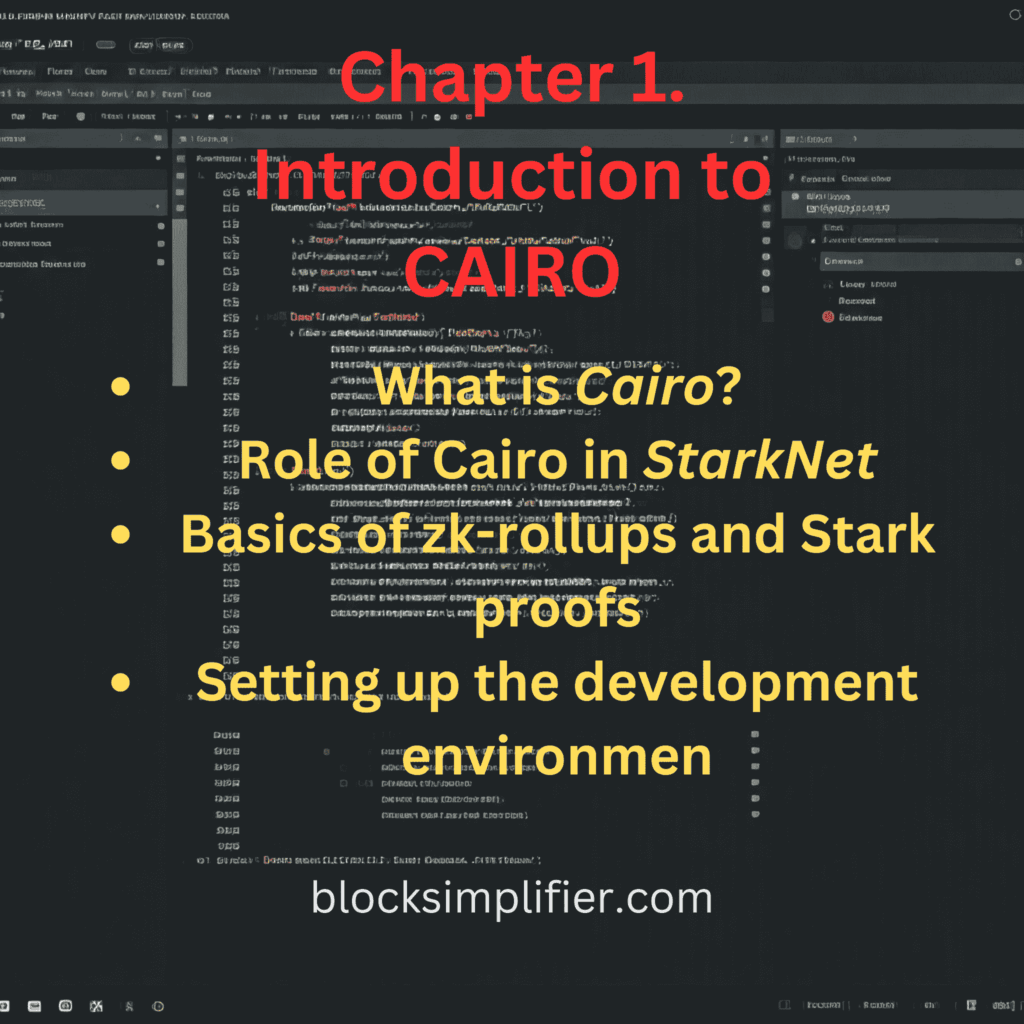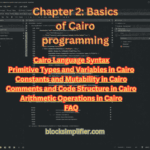Cairo is a excessive-degree programming language specifically designed for writing programs that may be efficiently tested by zero-knowledge (ZK) proofs. It plays a crucial position in the StarkNet environment, a layer-2 scaling solution for Ethereum.
Table of Contents
Key Features
- Designed for ZK-Proofs: Cairo is optimized to generate programs that can be easily converted into succinct and verifiable ZK-proofs. This is essential for the efficiency and security of StarkNet.
- High-Level Language: Cairo offers a person-friendly syntax, making it easier to expand and preserve clever contracts as compared to lower-level languages.
- StarkNet Integration: Cairo is the primary language for writing smart contracts at the StarkNet blockchain.
Role of Cairo in StarkNet
Cairo plays a pivotal function within the StarkNet environment, serving because the foundational programming language for building decentralized packages (dApps) and other functionalities on the community. Here’s a breakdown of its key functions:
1. Smart Contract Development:
- Primary Language: Cairo is the primary language used to write smart contracts on StarkNet. This means developers utilize Cairo to define the logic and rules governing the behavior of their applications within the StarkNet environment.
2. Program Verification:
- ZK-STARKs Integration: Cairo is specifically designed to be compatible with ZK-STARKs, a powerful type of zero-knowledge proof. This integration is crucial for StarkNet’s operation.
- Proof Generation: Cairo programs are structured in a way that facilitates the generation of ZK-STARK proofs. These proofs mathematically demonstrate the correctness of the program’s execution without revealing any sensitive data.
- Enhanced Security: The use of ZK-STARKs drastically enhances the safety of StarkNet. By verifying the correctness of each transaction through those proofs, the community can save you fraudulent activities and make sure the integrity of the device.
3. Scalability and Efficiency:
High Throughput: The ability to method transactions off-chain using ZK-STARKs allows StarkNet to reap high transaction throughput, making it suitable for disturbing packages.
Off-Chain Computation: ZK-STARKs enable a extensive part of the computational work to be achieved off-chain. This reduces the weight on the principle Ethereum blockchain, main to quicker transaction processing times and decrease transaction charges.
Zk-Rollups and Stark Proofs: A Simplified Explanation
zk-Rollups are a form of layer-2 scaling solution that technique transactions off-chain. Instead of publishing each transaction on the primary blockchain (like Ethereum), zk-rollups package a big variety of transactions into a single, succinct evidence. This proof is then proven on the main chain, extensively decreasing the computational load and improving transaction throughput.
Stark Proofs are a specific type of 0-information proof which might be especially efficient and flexible. They may be used to show the right execution of any computation, making them well-suited for verifying the correctness of Cairo programs. Stark proofs are regarded for their succinctness (small evidence length), efficiency (speedy verification), and generality (applicable to a wide variety of computations).
How zk-Rollups and Stark Proofs Work Together
- Transaction Bundling: A large number of transactions are grouped together off-chain.
- Computation: These transactions are processed off-chain, and the resulting state changes are calculated.
- Proof Generation: A Stark evidence is generated to demonstrate the correctness of the off-chain computations. This proof is a cryptographic construct that verifies the validity of the transactions with out revealing the information of the transactions themselves.
- Proof Submission: The generated Stark proof, in conjunction with the ensuing nation modifications, is submitted to the principle blockchain (e.G., Ethereum).
- Proof Verification: The main blockchain verifies the Stark proof to ensure the accuracy of the off-chain computations. This verification process is computationally inexpensive.
- State Update: If the proof is valid, the main blockchain updates its state to reflect the changes resulting from the off-chain transactions.
Benefits of zk-Rollups and Stark Proofs
- Scalability: By processing transactions off-chain, zk-rollups substantially increase the throughput of the blockchain, permitting faster and less expensive transactions.
- Security: Stark proofs provide sturdy cryptographic ensures about the correctness of the off-chain computations, improving the safety of the machine.
- Privacy: While now not the primary attention of zk-rollups, Stark proofs also can be used to offer some stage of privacy by using concealing the details of the transactions.
In essence, zk-rollups, powered by way of Stark proofs, provide a promising solution to the scalability challenges confronted via blockchains like Ethereum, allowing faster, inexpensive, and more secure transactions.
Would you like to delve deeper into a particular component of zk-rollups or Stark proofs, consisting of their technical info, use instances, or comparisons with different scaling answers?
Setting Up Cairo Development Environment
1. Installing Cairo
- Prerequisites:
- Install Python: Ensure you have Python 3.7 or later installed. You can download it from the official Python website: https://www.python.org/downloads/
Install pip: If you don’t have pip (Python package installer) installed, you can usually install it using the command: python -m ensurepip
- Install Cairo using pip:
- Open your terminal or command prompt.
- Execute the following command: Bash
pip install cairo-lang
2. IDE and Tools Setup
- Visual Studio Code (VS Code): A highly recommended and popular IDE for Cairo development.
- Install the Cairo extension: From the VS Code Marketplace, install the “Cairo” extension. This affords treasured features like syntax highlighting, code of completion, debugging support, and greater, enhancing your development enjoy.
- Other IDEs: While VS Code is highly recommended, you can also use other IDEs with appropriate plugins:
- Sublime Text
- Vim/Neovim
Key Considerations:
- Cairo Language Server: The Cairo extension often relies on a language server for advanced features. Ensure the language server is correctly installed and configured within your IDE.
- Debugging: If you plan to debug Cairo programs, you might need to set up a debugging environment. Refer to the Cairo documentation or community resources for specific instructions.
By following these steps, you’ll have a well-equipped development environment ready for building Cairo programs on the StarkNet ecosystem.
Would you like to know more about specific tools, libraries, or debugging techniques within the Cairo development environment?
FAQ
What are the advantages of Cairo over Solidity?
- Performance: Cairo programs are designed to be more efficient and faster to execute than Solidity programs, especially when using ZK-STARKs for verification.
- Security: Cairo leverages ZK-STARKs, which provide strong security guarantees and can help prevent common vulnerabilities like reentrancy attacks.
- Scalability: Cairo is optimized for zk-rollups, enabling high throughput and low latency on StarkNet.
How does Cairo compare to Rust?
- Focus: Rust is a general-purpose systems programming language, while Cairo is specifically designed for writing verifiable programs for ZK-rollups.
- Performance: Both languages are known for their performance and efficiency. However, Cairo may have some performance advantages when used within the context of ZK-STARKs.
- Learning Curve: Rust has a steeper getting to know curve due to its attention on reminiscence safety and ownership. Cairo has a greater streamlined syntax and may be simpler to learn for builders acquainted with high-level languages.
What are some common challenges when developing with Cairo?
- Learning Curve: While Cairo is designed to be person-friendly, it still has a mastering curve, specially for builders new to ZK-evidence systems and the StarkNet atmosphere.
- Debugging: Debugging Cairo applications can be extra hard than debugging Solidity programs because of the complexities of ZK-proofs and the off-chain execution environment.
- Tooling: While the Cairo environment is growing, it may no longer be as mature as the Solidity environment in phrases of available



Pingback: Chapter 2: Basics of Cairo programming - BlockSimplifier